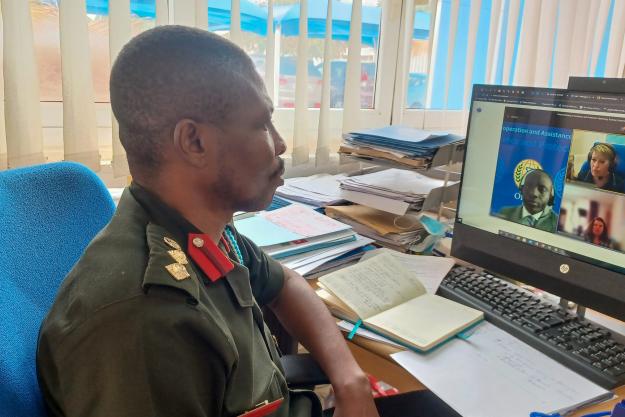
THE HAGUE, Netherlands—15 February 2022—The Organisation for the Prohibition of Chemical Weapons (OPCW) held a virtual meeting of assistance and protection partner training centres in the Africa region on 2 and 3 February 2022.
The meeting served as a platform for the OPCW Technical Secretariat to discuss plans for cooperation with partner training centres in Africa in 2022 and beyond.
Partner training centres are expert national institutions that help OPCW deliver capacity-building activities related to the implementation of Article X of the Chemical Weapons Convention (CWC), which covers assistance and protection against chemical weapons.
The meeting provided an opportunity to jointly review relevant assistance and protection training activities designed and implemented online during the pandemic. Participants shared their experiences with virtual training during the pandemic and discussed both the challenges and opportunities of this delivery modality.
Valuable insights into the operational and technical challenges in the region were discussed, as these play an important role in ensuring successful programme delivery. Participants from the partner training centres shared views about the impact the pandemic has had on their own activities.
Special attention was given to discussing assistance and protection activities in 2022, including how funding by the European Union could support in person regional capacity building as soon as circumstances permit.
The Head of the OPCW’s Assistance and Protection Branch outlined adaptations and adjustments made to the way OPCW’s International Cooperation and Assistance activities are being delivered, to maximise their effectiveness despite restrictions imposed by the pandemic. “Capacity building for African Member States continues to be a top priority for the Technical Secretariat. Priorities for the continent – as captured in the OPCW Africa Programme – include capabilities in responding to chemical incidents involving chemical warfare agents and toxic industrial chemicals. The OPCW will build on the knowledge and experience gained in hosting virtual events, which can supplement and complement in-person capacity building support that it hopes to resume as soon as conditions would permit.”
Donor partners providing voluntary funding to the Assistance and Protection programme in Africa also participated and shared presentations on the range of projects they support in Africa.
The meeting was attended by 38 participants, representing partner training centres in Africa and programme donors, of 14 OPCW Member States: Algeria, Canada, Czech Republic, France, Germany, Ghana, Kenya, Morocco, South Africa, Sudan, Switzerland, United Kingdom of Great Britain and Northern Ireland, United States of America, and Uganda.
Background
The Programme to Strengthen Cooperation with Africa on the Chemical Weapons Convention — known as the Africa Programme — focuses on the needs of OPCW Member States on that continent. It includes supporting national preparedness in the case of a chemical weapons attack as well as promoting the use of chemistry for peaceful and authorised purposes to support a developed, safe, and secure Africa.
As the implementing body for the Chemical Weapons Convention, the OPCW, with its 193 Member States, oversees the global endeavour to permanently eliminate chemical weapons. Since the Convention’s entry into force in 1997, it is the most successful disarmament treaty eliminating an entire class of weapons of mass destruction.
Over 99% of all declared chemical weapon stockpiles have been destroyed under OPCW verification. For its extensive efforts in eliminating chemical weapons, the OPCW received the 2013 Nobel Peace Prize.
